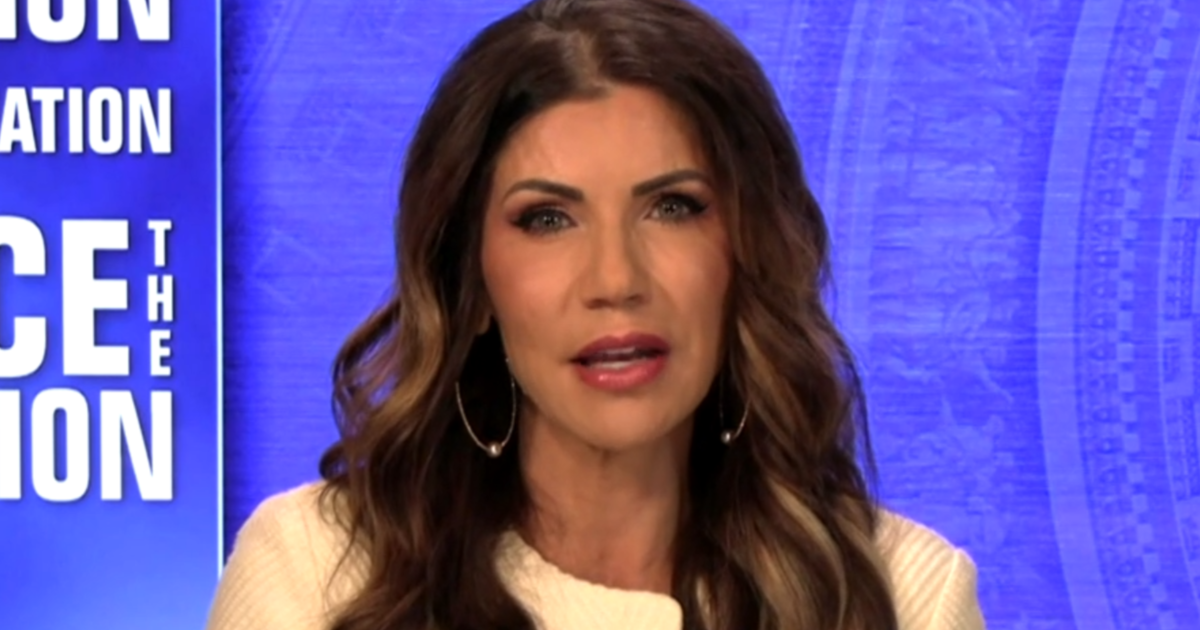Washington — South Dakota Gov. Kristi Noem on Sunday defended her state’s abortion trigger law that took effect after the Supreme Court’s decision to strip away the constitutional right to an abortion. She said in an interview with “Face the Nation” that in the cases of rape or incest, she does not believe one tragedy is “a reason to have another tragedy occur.”
“I believe every life is precious … And we know so much more using technology and science than we did even 10, 15 years ago about what these babies go through the pain that they feel in the womb, and will continue to make sure that those lives are protected,” Noem said. “And I just have never believed that having a tragedy or tragic situation happened to someone is a reason to have another tragedy occur.”
Transcript: South Dakota Gov. Kristi Noem on “Face the Nation”
South Dakota is one of 13 states with so-called “trigger laws” on the books, in which abortion would be outlawed immediately or soon after the Supreme Court overturned Roe v. Wade, the 1973 landmark decision that established the constitutional right an abortion.
The high court’s ruling Friday striking down Roe — in a case involving a Mississippi law banning abortions after 15 weeks of pregnancy — put those laws into effect. South Dakota’s measure, signed into law in 2005, prohibits the performance of abortions, except to save the life of the mother, and bans anyone from prescribing a woman drugs that induce an abortion. The law is “effective on the date that the states are recognized by the United States Supreme Court to have the authority to regulate or prohibit abortion at all stages of pregnancy.”
Noem said her state will now work to bolster resources for women who will now have to carry their pregnancies to term, including with more mental health counseling and family services.
South Dakota Gov. Kristi Noem on “Face the Nation,” June 206, 2022.
CBS News
“I would prefer that we continue to make sure we go forward and that we’re putting resources in front of these women and walking alongside them, getting them the health care, the care, the mental health counseling and services that they should need to make sure that we can continue to support them and build stronger families far into the future as well,” she said, adding, “The Supreme Court did its job: it fixed a wrong decision it made many years ago and returned this power back to the states, which is how the Constitution and our Founders intended it.”
The court’s decision made clear that the issue of abortion is one that will now be decided by elected officials in the states, but it also has set the stage for future legal fights about whether states can impose bans on Mifepristone, a FDA-approved drug that is used together with a second medication to induce an abortion within the first 10 weeks of pregnancy.
Attorney General Merrick Garland said in a statement Friday in response to the Supreme Court’s ruling that states may not ban Mifepristone “based on disagreement with the FDA’s expert judgment about its safety and efficacy.”
Noem in March signed a bill into law that restricted access to medication abortion by requiring women make at least three trips to a clinic to obtain the drugs and defended the limits she has imposed.
“It’s something that should be under the supervision of a medical doctor and it is something in South Dakota that we’ve made sure happens that way,” she said. “There are certain protections that are guarded under the Constitution of the United States. The rest of these items are left to the states, the 10th Amendment guarantees us that.”
In addition to spotlighting abortion pills, the court’s decision also raised questions about whether states that ban abortion can penalize companies that have announced they will cover expenses for employees who travel across state lines to obtain an abortion.
Noem suggested she would not go after corporations such as Walmort or Amazon that have workers in her state and have pledged to reimburse employees who get abortions elsewhere.
“We’re going to continue to support these mothers, make sure that they are protected from any kind of prosecution that would happen, make sure that these babies are recognized and that every single life is precious, and that we enforce our laws and I’ll continue to make sure that the people of our state and all they can speak to their elected representatives that will make those decisions closer to home than what we’re seeing at the federal level,” she said. “No intention to do that.”
She also said she does not anticipate South Dakota will take up proposals that incentivize residents to report women suspected of seeking or aiding in abortions, like a law passed in Texas.
“That’s never been the conversation in South Dakota, and I don’t anticipate that we will ever do that. We take privacy rights very important, we protect our freedom and our liberties here,” she said. “We will make sure that mothers have the resources, protection and medical care that they need, and we’re being aggressive on that.”
